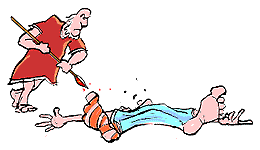
The hero Odysseus in Homer's epic from Greek mythology

Book Twenty-Four
|
The next morning Odysseus goes upcountry to the vineyard where his father, old King Laertes, labors like a peasant. Ever since his wife died of heartbreak for Odysseus, the miserable man has lived with his fieldhands. Odysseus cannot resist testing his father with a tall tale before their fond reunion.
Meanwhile, the kin of the suitors have borne off their dead and gathered at the assembly ground. The father of the suitor Antinous fires them up for revenge. Odysseus, Telemachus, the loyal herdsmen, Laertes and the fieldhands arm themselves to meet the challenge. Inspired by Athena, Laertes casts a lance through the helmet of Antinous' father, who falls to the ground in a clatter of armor. But at the command of Zeus, the fighting stops right there. Athena, in the guise of an old family friend, tells the contending parties to live together in peace down through the years to come. |
 |  | 
|
|
Laertes (lay-UR-teez)
Zeus (ZOOS or ZYOOS) Despite Odysseus' earlier prediction to his son, this is the only direct involvement of Zeus in the fighting on Ithaca. peace Thanks to the advice given to him in Hades by the seer Tiresias, the last years of Odysseus are indeed peaceful. In events which take place after the close of The Odyssey, but which are foretold by the prophet, Odysseus travels to the mainland and seeks out a community so far from the sea that the people lack all knowledge of it. As instructed, he carries an oar on his shoulder and walks inland until a passing stranger asks if it is some sort of agricultural implement. Here he plants the oar in the ground and makes a sacrifice to Poseidon. Together with another offering back on Ithaca to all the gods, this guarantees Odysseus a peaceful death. |
|
|
|
Featuring the hero Odysseus in Homer's epic from Greek mythology
|
 Book Twenty-Four
|
|
The next morning Odysseus goes upcountry to the vineyard where his father, old King Laertes, labors like a peasant. Ever since his wife died of heartbreak for Odysseus, the miserable man has lived with his fieldhands. Odysseus cannot resist testing his father with a tall tale before their fond reunion.
Meanwhile, the kin of the suitors have borne off their dead and gathered at the assembly ground. The father of the suitor Antinous fires them up for revenge. Odysseus, Telemachus, the loyal herdsmen, Laertes and the fieldhands arm themselves to meet the challenge. Inspired by Athena, Laertes casts a lance through the helmet of Antinous' father, who falls to the ground in a clatter of armor. But at the command of Zeus, the fighting stops right there. Athena, in the guise of an old family friend, tells the contending parties to live together in peace down through the years to come. |
 |  | 
|
|
Laertes (lay-UR-teez)
Zeus (ZOOS or ZYOOS) Despite Odysseus' earlier prediction to his son, this is the only direct involvement of Zeus in the fighting on Ithaca. peace Thanks to the advice given to him in Hades by the seer Tiresias, the last years of Odysseus are indeed peaceful. In events which take place after the close of The Odyssey, but which are foretold by the prophet, Odysseus travels to the mainland and seeks out a community so far from the sea that the people lack all knowledge of it. As instructed, he carries an oar on his shoulder and walks inland until a passing stranger asks if it is some sort of agricultural implement. Here he plants the oar in the ground and makes a sacrifice to Poseidon. Together with another offering back on Ithaca to all the gods, this guarantees Odysseus a peaceful death. |